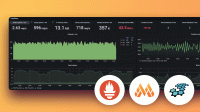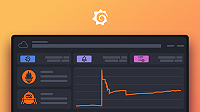This is documentation for the next version of Alloy. For the latest stable release, go to the latest version.
otelcol.processor.memory_limiter
otelcol.processor.memory_limiter is used to prevent out of memory situations
on a telemetry pipeline by performing periodic checks of memory usage. If
usage exceeds the defined limits, data is dropped and garbage collections
are triggered to reduce it.
The memory_limiter component uses both soft and hard limits, where the hard limit
is always equal or larger than the soft limit. When memory usage goes above the
soft limit, the processor component drops data and returns errors to the
preceding components in the pipeline. When usage exceeds the hard
limit, the processor forces a garbage collection in order to try and free
memory. When usage is below the soft limit, no data is dropped and no forced
garbage collection is performed.
NOTE:
otelcol.processor.memory_limiteris a wrapper over the upstream OpenTelemetry Collectormemorylimiterprocessor. Bug reports or feature requests will be redirected to the upstream repository, if necessary.
Multiple otelcol.processor.memory_limiter components can be specified by
giving them different labels.
Usage
otelcol.processor.memory_limiter "LABEL" {
check_interval = "1s"
limit = "50MiB" // alternatively, set `limit_percentage` and `spike_limit_percentage`
output {
metrics = [...]
logs = [...]
traces = [...]
}
}Arguments
otelcol.processor.memory_limiter supports the following arguments:
| Name | Type | Description | Default | Required |
|---|---|---|---|---|
check_interval | duration | How often to check memory usage. | yes | |
limit | string | Maximum amount of memory targeted to be allocated by the process heap. | "0MiB" | no |
spike_limit | string | Maximum spike expected between the measurements of memory usage. | 20% of limit | no |
limit_percentage | int | Maximum amount of total available memory targeted to be allocated by the process heap. | 0 | no |
spike_limit_percentage | int | Maximum spike expected between the measurements of memory usage. | 0 | no |
The arguments must define either limit or the limit_percentage, spike_limit_percentage pair, but not both.
The configuration options limit and limit_percentage define the hard
limits. The soft limits are then calculated as the hard limit minus the
spike_limit or spike_limit_percentage values respectively. The recommended
value for spike limits is about 20% of the corresponding hard limit.
The recommended check_interval value is 1 second. If the traffic through the
component is spiky in nature, it is recommended to either decrease the interval
or increase the spike limit to avoid going over the hard limit.
The limit and spike_limit values must be larger than 1 MiB.
Blocks
The following blocks are supported inside the definition of
otelcol.processor.memory_limiter:
| Hierarchy | Block | Description | Required |
|---|---|---|---|
| output | output | Configures where to send received telemetry data. | yes |
| debug_metrics | debug_metrics | Configures the metrics that this component generates to monitor its state. | no |
output block
The output block configures a set of components to forward resulting telemetry data to.
The following arguments are supported:
| Name | Type | Description | Default | Required |
|---|---|---|---|---|
logs | list(otelcol.Consumer) | List of consumers to send logs to. | [] | no |
metrics | list(otelcol.Consumer) | List of consumers to send metrics to. | [] | no |
traces | list(otelcol.Consumer) | List of consumers to send traces to. | [] | no |
You must specify the output block, but all its arguments are optional.
By default, telemetry data is dropped.
Configure the metrics, logs, and traces arguments accordingly to send telemetry data to other components.
debug_metrics block
The debug_metrics block configures the metrics that this component generates to monitor its state.
The following arguments are supported:
| Name | Type | Description | Default | Required |
|---|---|---|---|---|
disable_high_cardinality_metrics | boolean | Whether to disable certain high cardinality metrics. | true | no |
level | string | Controls the level of detail for metrics emitted by the wrapped collector. | "detailed" | no |
disable_high_cardinality_metrics is the Grafana Alloy equivalent to the telemetry.disableHighCardinalityMetrics feature gate in the OpenTelemetry Collector.
It removes attributes that could cause high cardinality metrics.
For example, attributes with IP addresses and port numbers in metrics about HTTP and gRPC connections are removed.
Note
If configured,disable_high_cardinality_metricsonly applies tootelcol.exporter.*andotelcol.receiver.*components.
level is the Alloy equivalent to the telemetry.metrics.level feature gate in the OpenTelemetry Collector.
Possible values are "none", "basic", "normal" and "detailed".
Exported fields
The following fields are exported and can be referenced by other components:
| Name | Type | Description |
|---|---|---|
input | otelcol.Consumer | A value that other components can use to send telemetry data to. |
input accepts otelcol.Consumer data for any telemetry signal (metrics,
logs, or traces).
Component health
otelcol.processor.memory_limiter is only reported as unhealthy if given an invalid
configuration.
Debug information
otelcol.processor.memory_limiter does not expose any component-specific debug
information.
Compatible components
otelcol.processor.memory_limiter can accept arguments from the following components:
- Components that export OpenTelemetry
otelcol.Consumer
otelcol.processor.memory_limiter has exports that can be consumed by the following components:
- Components that consume OpenTelemetry
otelcol.Consumer
Note
Connecting some components may not be sensible or components may require further configuration to make the connection work correctly. Refer to the linked documentation for more details.



